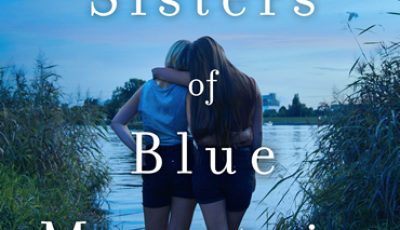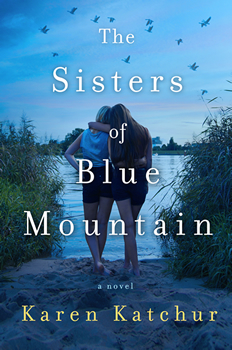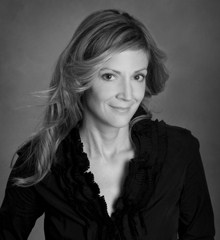

The Sisters of Blue Mountain by Karen Katchur
 By Karen Harper
By Karen Harper
Karen Katchur writes suspense novels that beautifully blend a compelling setting with a realistic story. Her background in criminal justice makes her work feel “you-are-there” authentic. The focus on family also moves her novels into the realm of psychological fiction.
This month, Katchur took time out of her busy schedule to provide insight into her thrilling new release, THE SISTERS OF BLUE MOUNTAIN, and share with The Big Thrill some of the secrets behind her success.
Please tell us what THE SISTERS OF BLUE MOUNTAIN is about.
For Linnet, owner of a Bed and Breakfast in Mountain Springs, Pennsylvania, life has been a bit complicated lately. Hundreds of snow geese die overnight in the dam near the B&B, sparking a media frenzy, threatening the tourist season, and bringing her estranged younger sister, Myna, to town. If that isn’t enough, the women’s father has been charged with investigating the incident. But when a younger expert is brought in to replace him on the case and then turns up dead on Linnet’s property, their father becomes the primary suspect. As the investigation unfolds, the sisters will have to confront each other, their hidden past, and a side of Mountain Springs not seen before.
What a perfect background you have to write mystery, suspense or thriller with your BA in Criminal Justice. How did you use that degree before writing and how does it impact your plots and characters now?
Interestingly enough I didn’t pursue a career in Criminal Justice after graduation. I had every intention of going to law school, but after interning in a district attorney’s office, I learned a couple of things about myself. The biggest one being that I didn’t like to argue. (My husband might disagree with me here!) And arguing is kind of an important part of being a lawyer. Also, I was much too sensitive for what the job required. The Victims Unit was particularly hard.
However, I do have a solid foundation of how the Criminal Justice system works. I was in a unique position to see it in action when I happened to be with a friend who discovered a body in a parking lot. The body turned out to be a murder victim. I was already majoring in Criminal Justice at the time, so I stuck around to observe the processing of the crime scene. By the time the case came up for trial, I was working in the DA’s office. Most people who work in the system only get to see the part that is their job. I was able to see the entire process from the discovery of the body, the investigation of the crime scene, the trial, and eventually the conviction.
As far as helping with characters and plot, I find I’m more attuned to the human aspect of crime which I attribute to my stint in the field. I learned quickly that not everything is as it seems. There are a lot of gray areas in criminal law. It’s these areas of the law I like to explore in the plots. For example in THE SISTERS OF BLUE MOUNTAIN, one of the questions I want readers to ask themselves at the end of the novel is whether they believe two of the characters are criminally liable for their actions or just morally liable.
Also, so much has changed in the fields of forensic science and technology that I’m constantly learning and trying to keep up. I admit I find it all fascinating.
The cover of your book emphasizes the sister bond as well as the beauty of the setting. How do you balance a relationship novel with the mystery? I’m reminded of the Nancy Mitford quote, “Sisters are a shield against life’s cruel adversity.” To which Nancy’s own sister, Jessica, replied, “But sisters ARE life’s cruel adversities.” Does that sort of family tension figure in this novel?
As for how I balance a relationship novel with the mystery, it’s not easy! I often feel as though I’ve taken on a bit too much. But it seems that’s my style, and I think I straddle the genres—mystery/suspense/women’s fiction—pretty evenly. Although, I think my novels tend to be a darker read than most women’s fiction, so I occasionally get some backlash from that, which is fine! It is what it is.
As for the sister relationship, it can be incredibly complex and rife with tension. And for those of us who have sisters, it can likely be the longest relationship we’ll have in our lifetime. Like the quote you mentioned, a sister can be your strongest advocate or your worst enemy. In THE SISTERS OF BLUE MOUNTAIN, I explore the relationship between two sisters who were once as close as they could be, and how a tragic event, one bad decision, tears them apart, and whether or not they can find their way back to each other.
I am also impressed with the impact of setting in your book covers—as well as the Blue Mountain title. How do you view the impact of your settings on your story and main characters?
Starting with setting is a natural part of the creative process for me. I often begin the story with the characters interacting with the setting in some way. Put it this way, my setting comes before my characters. I need to have an intimate knowledge of the setting and its history in order for the story to form. I don’t know if this is true of other writers, but it’s almost like I have a mental character sketch for my setting before I begin. Sound weird?
Let me give you an example. The first line in The Secrets of Lake Road: “No one touched the bottom of the lake and lived.” I begin the novel with a couple of kids swimming in the lake when one of them finds an old horse’s bit. Their curiosity about it brings the adults around, and it’s when everyone is distracted by the horse’s bit that a little girl disappears from the beach. The history behind the bit (and this is true!) was that a horse and carriage had broken through the frozen lake and were never recovered. So in this sense, the lake has claimed its first victim, setting the tone for what’s to come.
The first line in THE SISTERS OF BLUE MOUNTAIN: “Spring came early the year the birds fell from the sky.” Again, I start with an incident directly related to the setting. The sisters’ family owns a B&B and every year tourists come to see the snow geese migration. I open the first chapter with hundreds of snow geese turning up dead in the dam.
Your previous mystery The Secrets of Lake Road (Aug. 2015) also indicates your love of place. Are your books set in specific places you know and love? If so, have you fictionalized them somewhat to fit the needs of the story?
Yes! I grew up at a time when parents kicked their kids out of the house and told them not to come back until dinner. The Blue Mountains and Pocono Mountains, the Delaware River, Appalachian Trail, lakes and streams etc… were my stomping grounds when I was a kid. There was an underlying sense of danger or a kind of instinctive fear just below the surface of everything we did when we were in the woods or swimming in the river or lakes. The juxtaposition between the natural beauty of the area and the underlying danger it presents makes for perfect settings for mystery/suspense novels.
I do fictionalize some aspects of the setting to fit the needs of the story. Story comes first! In THE SISTERS OF BLUE MOUNTAIN, I built a fictional town called Mountain Springs around a very real dam near where I grew up. I ice skated, fished, and canoed on the dam, but the town itself isn’t exactly a “tourist town”, so I made one up.
And just so you don’t think I spent all of my time hanging out in the woods, the small town where I grew up is about an hour or so from NYC, so I had the best of both worlds.
Can you give beginning writers any advice on how you find the discipline to write? Any hints on blending the writing life with the demands of real life?
Recently, I listened to a podcast interview with author, Sue Miller (I’m a big fan!), and she said something that really struck me. She said she learned to be “interruptible.” I have two teenage daughters (I started writing when they were toddlers). I think I unknowingly trained myself to be “interruptible.” To write you don’t need to go away for an entire week or month or more. You can do it and be interrupted while doing it. The trick is to come back to it at the first opportunity.
As for discipline, I write for a few hours while my kids are in school. I keep a notebook handy to jot things down when I can’t get to my computer. The best I can say for beginning writers is to treat it like a job. Choose your hours and get to work.
*****
 Karen Katchur holds a Bachelor of Science degree in Criminal Justice from West Chester University and a Masters of Education degree from East Stroudsburg University. She lives in Eastern Pennsylvania with her husband and two children.
Karen Katchur holds a Bachelor of Science degree in Criminal Justice from West Chester University and a Masters of Education degree from East Stroudsburg University. She lives in Eastern Pennsylvania with her husband and two children.
To learn more about Karen, please visit her website.
- Kaanapali Beach Paradise by R. Barri Flowers - February 29, 2020
- Mortal Music by Ann Parker - January 31, 2020
- Always Look Twice by Elizabeth Goddard - September 30, 2019
